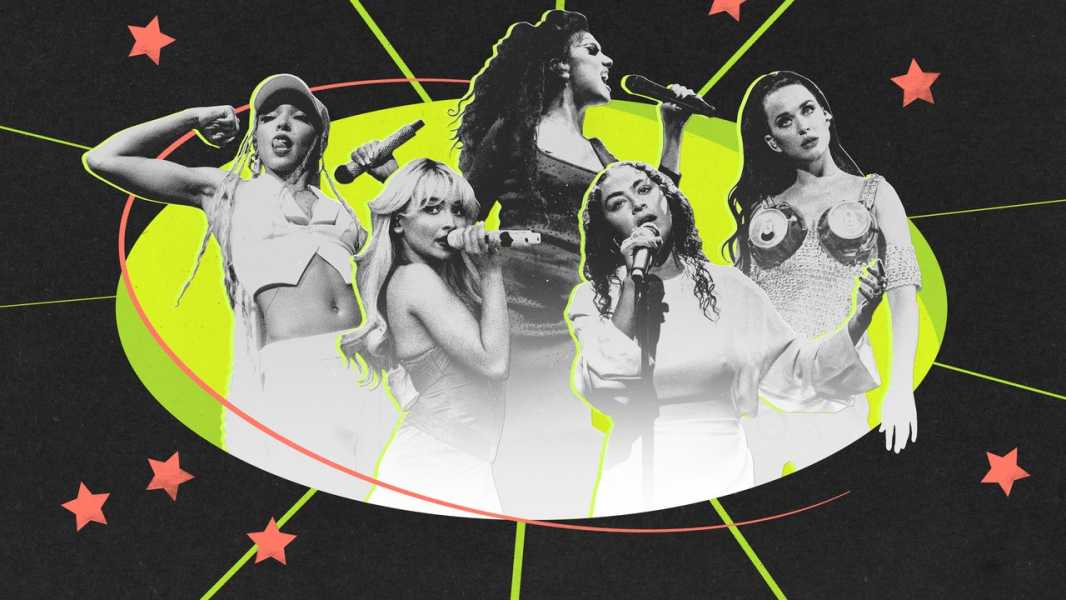
Save this storySave this storySave this storySave this story
Katy Perry’s breakout moment, in the late two-thousands, had a type of frivolity and irreverence that feels difficult to summon now. Her début single, “I Kissed a Girl,” from 2008, is just what it sounds like, a giddy retelling of some lightly illicit experimentation. “I kissed a girl just to try it / I hope my boyfriend don’t mind it,” she sings in the chorus, as the anthemic track marches to the forceful beat of a kick drum. “Teenage Dream,” Perry’s album from 2010, was a frothy delight that exploited the most beloved tropes and the broadest promise of American pop music: eternal youth. The title track hewed closely to the theme: “We can dance until we die / You and I, we’ll be young forever.”
“Teenage Dream” was emblematic of an early Obama era of colorful, hedonistic pop music made by women. Long before TikTok became a social-media phenomenon, the pop singer Kesha made her début, in 2009, with a single of the same name, a blaring electro-pop hit that minted Kesha—who, at the time, stylized her stage name as Ke$ha—as a heroically sloppy party girl, whose sing-rap voice was filtered through Auto-Tune. With stringy, unwashed hair, a nose piercing, and an affinity for experimental makeup choices, Kesha did not fit the bill for a conventional female pop star, but she became hugely successful nonetheless. She was a grimy club rat with an epic eye roll and a knack for inventive vocal patterns and inflections that could get lodged in listeners’ bodies and brains. Many critics derided her, but, in hindsight, Kesha’s début album, “Animal,” was one of the spryest pop records in modern history, and “TiK ToK” topped the Billboard charts for nine straight weeks. Elsewhere on the charts during this era, with the campy, persona-driven music of new stars like Lady Gaga and Nicki Minaj, pop was a lot of fun—a larger-than-life parade of pleasure and spectacle.
The moment may have been so over the top that it would leave us with a decade-long hangover. Lorde made her début with “Royals,” an unexpected and understated smash hit that dominated the airwaves in 2013 and critiqued the excesses of pop music and the perceived largesse of hip-hop. With her first two studio albums, “Pure Heroine,” from 2013, and “Melodrama,” from 2017, Lorde became the poster child for a wave of anti-pop stars who pushed back on the major-label pop machinations of previous generations. Lana Del Rey became an enduring pop icon with her noirish singing and songwriting; Billie Eilish would eventually take over the charts, her moodier pop music colored with gothic undertones. The world’s latest megastar, Olivia Rodrigo, became a global sensation with a bratty, punk-inflected sound. In these years, streaming technology helped fracture pop conventions by allowing genres to commingle. These young stars posed a further existential threat to pop, by challenging its emotional and stylistic traditions. Often, the music didn’t evoke the club but, rather, a lonely girl’s bedroom.
This summer, though, has been filled with pure pop moments that call back to an earlier time. The stickiest song of the summer has been “Espresso,” from the former Disney star Sabrina Carpenter. Proudly silly and effervescent, it’s a faintly funky electro-pop song with lyrics so goofy and nonsensical they achieved near-instant global meme status. “I’m working late ’cause I’m a singer,” she sings breathily, drawing out the syllables as if daring you to take the words seriously. Carpenter, a bottle blonde with Disney training and an affection for addictive hooks and elaborate music videos, seems like a throwback to a different time when American female pop stars dominated; fittingly, she cites Christina Aguilera as one of her influences. Like “Espresso,” other songs and records of this season have been exuberant, hyperfeminine, and primed for viral success: The pop and R. & B. singer Tinashe, after many fallow years, experienced a renaissance with “Nasty,” a hyper-suggestive song on which she asks, “Is somebody gonna match my freak?” These words have become a call to arms, eliciting scores of women on TikTok and Instagram to broadcast their “freak” habits and interests.
But nobody has set this summer’s pop mood quite like Charli XCX, the prolific British singer who seems to keep one eye on social media and the other on the club dance floor at all times. Though she has been working for more than a decade as a cult favorite and an influential figure just outside of the center of pop, her true breakout moment came this June. She released “BRAT,” an album that brings some anti-pop sensibilities into the current moment of flippant, girlish pop. The record is a frenetic assortment of skittering, off-kilter electronic club beats and heavily filtered, high-pitched vocals, though at times the music on “BRAT” has seemed secondary to its online footprint.
Part of Charli XCX’s savvy lies in her ability to take the Internet’s temperature at any given moment, and to curate references accordingly. She released “360,” a single from “BRAT,” in May, and its music video featured a shrewd selection of young Hollywood starlets and online It Girls (Rachel Sennott and Chloë Sevigny among them), making the song an instant source of chatter. The song’s lyrics are like a free-associative word cloud, an assemblage of vague ideas about glamour and celebrities that listeners can disappear into. “Put the camera flash on / So stylish / Baby tears all gone,” the chorus goes. The track, co-produced by the underground British electronic musician A. G. Cook, sounds like a pop classic tilted slightly off its axis—the vocals are pitched up, the synths irreverently shrill.
For the pop stars of ten or twenty years ago, girlhood and femininity presented a double bind. They were necessary parts of building a persona, but also a source of derision. These days, femininity in pop culture is approached from a cool remove and treated as meta-commentary, even in mass culture, à la Greta Gerwig’s “Barbie.” Toward the end of the “BRAT” album rollout, Charli XCX released a remix of one of the album’s most sombre and contemplative tracks, “Girl, so confusing,” about the complexities of modern womanhood, particularly under a spotlight that alternates between flattering and harsh. When the original version of the song came out, fans speculated that some of its lyrics—“You’re all about writing poems / But I’m about throwing parties”—were about Charli’s relationship with Lorde. In a clever celebrity chess move, they “worked it out on the remix,” with Lorde in her most confessional, evocative mode, singing directly to Charli about her reluctance to collaborate: “I was so lost in my head / And scared to be in your pictures / ’Cause for the last couple years / I’ve been at war in my body / I tried to starve myself thinner.”
The biggest hits of the summer have traded on a canny form of femininity, full of winking vernacular and knowing references. Earlier this month, Katy Perry entered the fray with “Woman’s World,” her first single in four years. It’s a song that seems to ignore the past few years of stylistic and affective evolutions in pop, platitudinal and bland, pop sloganeering in its broadest form. “It’s a woman’s world / And you’re lucky to be living in it,” she sings on the chorus. Throughout the song, Perry recites a list of roles women are capable of playing, in the third person. Examples include winners, champions, superhumans, sisters, mothers. “She’s a flower,” Perry sings, “she’s a thorn.”
The songwriting and production of “Woman’s World” are as direct and conventional as its themes. For her new album, “143,” Perry has returned to Max Martin and Dr. Luke, two of the producers she worked with on her earliest and most successful records. For the better part of this century, these were two of the names pop stars and record labels have turned to in search of a dance-pop single that’s a sure bet. Dr. Luke’s track record, though, has been marred by an intense cultural and legal battle with Kesha, who alleged that the producer subjected her to sexual abuse and years of emotional turmoil, and who fought to be released from onerous record contracts that would keep her entangled with him. Dr. Luke denied the allegations and countersued for defamation, and no criminal charges were ever filed. The dispute ultimately ended in something of a stalemate when, last summer, the two landed on a “joint resolution” of their legal battle before an upcoming trial.
Surely, the irony of producing a song about women’s power with a male producer beleaguered by abuse allegations cannot be lost on Perry. It’s probably why she built an escape hatch directly into the song’s rollout: the music video for “Woman’s World” is all costumery and jokes; it begins with Perry in a construction-worker getup, a G-string peeking out from her denim shorts as she stands with a bunch of women before a row of urinals. What follows is a Barbie movie’s worth of visual gags: Perry pumping her buttcheek with a gas nozzle, applying makeup in the passenger’s seat of a monster truck, stealing a ring light in the shape of the symbol for female, then parading through the air with it.
The symbolism and gimmickry is so muddled and loose that it has allowed Perry to write off any critiques of the record. After an immediate intensely negative reaction to the single, Perry came online to address her critics, reassuring them they had misread her intentions: “YOU CAN DO ANYTHING! EVEN SATIRE!” she wrote. “We’re kind of just having fun, being a bit sarcastic,” she explained in a video. “It’s very slapstick.” But both the song and music video are such tonal failures that you wonder if Perry was really in on the joke.
A slightly more compelling comeback single is Kesha’s “Joyride,” from her first record independent of Kemosabe, the label founded by Dr. Luke. Kesha has spent the past few years evolving beyond the styles she developed there, experimenting with eclectic genre influences, psychedelia and more strident feminist and diaristic themes. But she’s never regained the ubiquity she had in her early career. “Joyride” marks a return to form, reviving the insouciant attitude and club-ready sounds of the “Animal” days, along with her indelible sing-rap cadences. (Kesha, in fact, would have been an ideal feature on “BRAT.”) But there are a few touches that place it squarely in the present. She celebrates no longer being a “label whore,” a clear reference to her split from Kemosabe. Her jeers are no longer expressions of youthful defiance—they express a seasoned weariness with pop stardom itself. “This party sucks, I’m ’bout to ditch,” she raps, half sneering. “Don’t even try to give me shit / I’ve earned the right to be like this.” ♦
Sourse: newyorker.com






